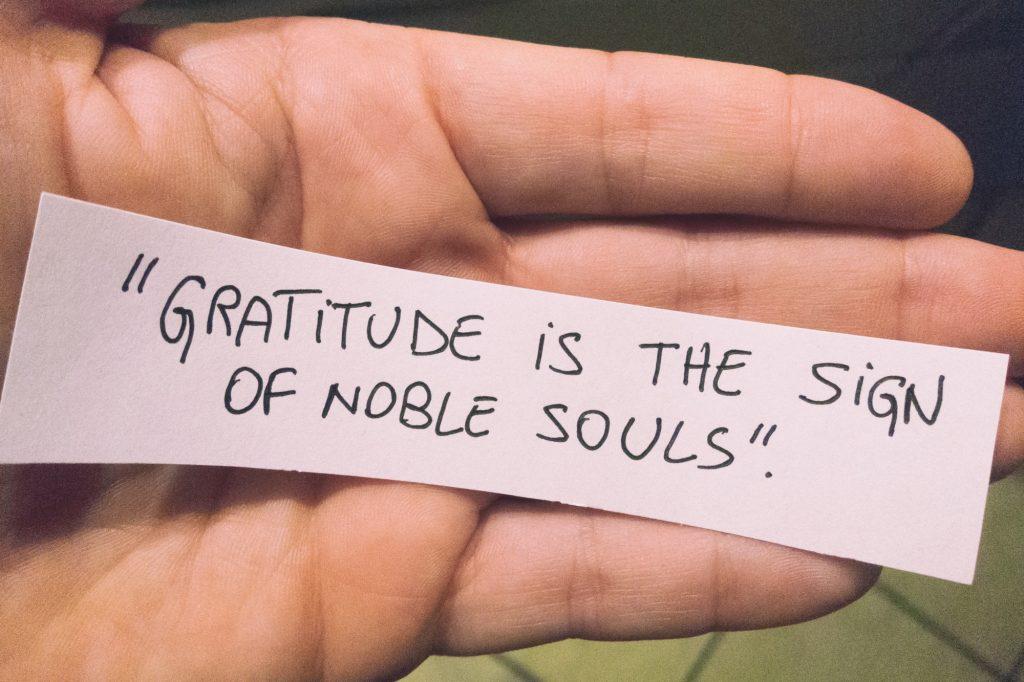There are many things that might elicit pleasant feelings of thankfulness or appreciation, which can lead to a sense of significance and improved health.
"Make it a practice to be grateful for everything that comes your way and to express gratitude on a regular basis. And, because everything has contributed to your success, you should express thanks for everything."- Ralph Waldo Emerson
The phrase gratitude comes from the Latin word gratia, which means grace, graciousness, or gratefulness (depending on the context). Gratitude incorporates all of these meanings in some ways. Gratitude is an expression of thankfulness for what one receives, whether material or intangible.
People express their thanks for the positive things in their lives. During this process, people frequently understand that the source of that kindness is at least partially outside of themselves. As a result, thankfulness allows people to connect to something greater than themselves, whether that something be other people, nature, or a higher power.
A positive psychology study has found a strong and consistent link between gratitude and happiness. People can feel more positive emotions, appreciate amazing events, improve their health, manage with adversity, and develop strong friendships when they are grateful.
Why gratitude is important
Gratitude has been demonstrated in numerous studies to offer a number of physical, psychological, emotional, and social advantages. It allows us to appreciate all of the great aspects of our life and the people who are a part of them. While thankfulness isn’t a panacea or a cure-all for everything, it may help us stay grounded and cheerful, especially in times of uncertainty.
Many of us have experienced emotions of discontent, in which we believe our lives are unfinished and lacking in the things we desire. It’s natural to compare yourself to others’ seemingly perfect lifestyles and condemn yourself as inadequate at such moments. Gratitude is a simple exercise that might help to reduce unpleasant sentiments.
Benefits of Practicing Gratitude

1. Gratitude makes us happier
According to a 2003 study, those who practice gratitude are “considerably more satisfied with their life as a whole.” They had a greater sense of hope for the future as well as a stronger sense of connection with others.
The study found that practicing gratitude resulted in significant and sustained improvements in an individual’s sense of well-being. Gratitude and happiness, it appears, are inextricably intertwined. Those looking for a way to happiness might think about how being appreciative can assist.
2. Gratitude leads to positivity
Gratitude, in addition to being a great emotion in and of itself, has the ability to bring out the best in other feelings. Positive emotions, according to a 2017 study, assist people to develop psychological, intellectual, and social resources. Furthermore, thankfulness practices may aid in motivating people to engage in beneficial behaviors that lead to self-improvement.
The study discovered evidence that expressing thankfulness can make people feel connected, elevated, and humble. All of these, as well as other factors, are essential for living a thoughtful life.
3. Gratitude helps in making new friends
Gratitude is ingrained in human DNA, and its forerunner, reciprocity, may still be seen in nature. These systems enable us to trade goods for the advantage of both parties. When someone does something good for us, our brains respond by making us want to return the favor, implying that we care about others and that others care about us.
According to research, even something as simple as thanking a new acquaintance for their assistance might increase the likelihood of forming a social bond. Furthermore, additional research has found that being appreciative of your mate might improve your love connections.
4. Gratitude can help to boost one’s career
You can become more helpful, empathetic, and forgiving if you practice gratitude. Several studies have suggested that practicing thankfulness can help you be happier at work. All of these are beneficial characteristics of the job, but the research doesn’t stop there.
According to a 2016 study, appreciation and respect in the workplace might make employees feel valued and appreciated. Similarly, according to a 2015 study, thankfulness aids people in finding significance in their professions.
How to Incorporate Gratitude in Our Lives

Gratitude can be incorporated into your life in a variety of ways. It’s easy to incorporate more appreciation into your daily life, and it’s one of the most accessible ways to improve your quality of life. Here are a few suggestions to get you started on your journey of gratitude.
1. Maintain a gratitude notebook
Keeping a gratitude diary is definitely something you’ve heard of, and it’s as simple as jotting down a few items at the same time each day to build a habit. It may sound unusual at first, but once you get the hang of it, you’ll find that reflecting on the positives doesn’t take much thought or effort. Instead of dwelling on the problems, you’re essentially training your brain to look for the positives and to start or end your day with thoughts of thanks and gratitude.
2. Make an ‘attitude of gratitude’ a habit
It takes work and perseverance to keep a happy mindset. It’s easy to resort to old negative habits and internal language when something awful happens – “I felt something bad was going to happen.” “Why does this happen to me all the time?” You must make a conscious effort to retrain your thoughts, and when anything goes wrong, instead of focusing on the obvious flaws, look for something to be grateful for.
3. Meditation
Gratitude meditation can help with emotion control and self-motivation. Gratitude meditation is a style of meditation that emphasizes being grateful for many parts of one’s life and the world around them.
4. Gratitude jars
Writing down short notes of what you’re grateful for and preserving them in a jar or container is another visual technique for practicing gratitude. Not only will you have a visual representation of everything you’re grateful for, but you’ll also be able to read the notes again when you need a reminder.
5. Reaching out
Consider a moment when someone did something extremely nice for you or helped you out when you really needed it, and you didn’t take the time to thank them properly. Take a few moments to write them a message or phone them to express your gratitude. This will not only make the person getting the thanks happy, but it will also provide you with the advantages of expressing your gratitude.
6. Mealtime ritual of gratitude
Make talking about what you’re grateful for today a mealtime ritual with your family. It will be simple to maintain your schedule after you have established one. Leading by example and teaching children to be grateful from a young age will ensure that they get the benefits of gratitude as well, and will set them up to be happy adults in the future.
Gratitude does not require that you wear rose-colored glasses all of the time. It also doesn’t indicate that everything is perfect; rather, it implies that you are aware of your blessings, appreciate the small things, and realize what you do have.
Gratitude turns the focus away from what is lacking or unsatisfactory and toward what is already present and wonderful. We often take for granted everything that is actually wonderful in our lives, preferring to focus on what we believe is wrong, what we lack, or what we dislike.
Also read:


